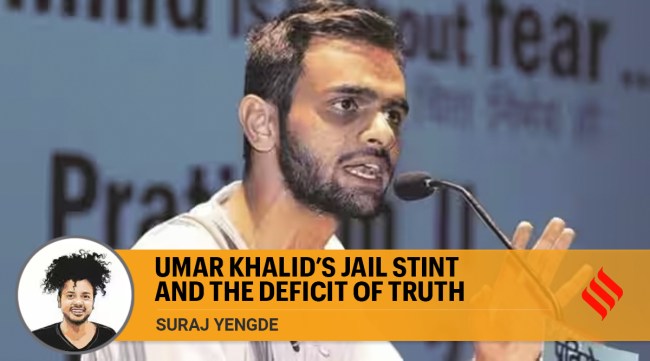Opinion Umar Khalid’s jail stint and the deficit of truth
A doctorate in Adivasi history from Jawaharlal Nehru University, Umar Khalid has been an active comrade student on campus.
 Umar Khalid is charged with instigating the Delhi riots. (Express File Photo)
Umar Khalid is charged with instigating the Delhi riots. (Express File Photo) Umar Khalid, India’s student icon and youth leader, is in jail. Unfortunately, his is not a profile that parents would like their children to replicate. But this is what the current regime has given to the youth of the country. A simply dressed man, slender in shape with powerful oratory, the extraordinary crown that Khalid wears is that of an anti-Brahminical agent in this Modi era.
A doctorate in Adivasi history from Jawaharlal Nehru University, Khalid has been an active comrade student on campus. He shot to fame in 2016 when the BJP regime launched vitriolic attacks against the Left-dominant JNU. Khalid’s TV appearances were used by loud-mouthed media anchors to demolish his reputation.
Khalid is charged with instigating the Delhi riots. A Delhi court had torn into the Delhi Police probe into the riots cases, calling it “callous” and “indolent” and basing it on a non-partisan investigation. The absurdity and foolishness of the investigation derail the trust in the police.
The Delhi riots of 2020 was dirty play. The nationwide momentum against the CAA-NRC legislation was proving difficult for the government to handle.
Umar has already fielded himself as a lover of the nation. His testimonial has garnered attention among those who look up to him as an icon. He is already a brother to many, and his fraternity seems to be continuously spreading in the Hindi belt and beyond.
Umar is part of a chapter of India’s new political science. His experiences and the repeated injustices he has met at the hands of the state make him a modern hero at a time when many among the youth are unemployed and depend on their parents to get by. When nepotism is India’s greatest assertion, scholars like Khalid come out of the path challenging the absurdity.
An Ambedkarite atheist, Umar can serve as an inspiration to the Bahujan youth. It is the responsibility of the Bahujan political and social sphere to own up to the cause of Umar Khalid. They must make this struggle their own and rally for Umar’s freedom. Though time and again the Bahujan community has been wrongly judged by the liberal force, they have yet stood by the Constitution and their faith in their Republic.
They picket for the protection of liberties that Dr Ambedkar held so dearly in his heart. He knew the cost of liberty was unmeasured in the political sense.
Umar’s incarceration is now a concern for international governments. The United States Commission on International Religious Freedom has a profile on Umar Khalid. The Indian diaspora activists in the US have put his portraits on trucks in New York, petitioning for his release.
There’s something sinister about his arrest. Not least the merit of the case, which is clearly unmeritorious, but about the story of Umar as an evolving young man of the country. His position on the viciousness of caste has set him apart from the obviating positions of the Brahminical left of India.
In jail, Umar is keeping up with his reading habits. According to Ajaz Ashraf’s column in the Mid-Day, by April 2022, Umar had read 102 books. As we write, he must have comfortably read many more. His partner, Banojyotsna Lahiri, keeps him and the world updated about each other. Theirs is a story of commitment to the future and being present in each other while separated by a glass wall of Tihar jail.
The tragedy of this episode, like Bhima Koregaon and many of those politically incarcerated, is that the majority of Indians might still not be convinced of the case against the accused, but they want to believe. It is this culture that is secularised by the regime. We are witnessing how counterrevolution is created in the longer term. The weapon of emotion and belief is justified at the cost of questions, reason and temperament.
The deficit of truth has become the adage of the nation. It further sinks into the trenches of madness wherein the promise of a nation is dwarfed.
Umar Khalid has undergone the pains of those who fronted the tyrant on the battlefield. A life attempt, sedition, and prolonged jail for standing up to the principles upon which the nation was constructed. Umar’s incarceration presents to us the dilemma of a nation-state —whether it is to serve the people or genuflect to certain interests.
(Suraj Yengde, author of Caste Matters, curates Dalitality and is
currently at Oxford University)





